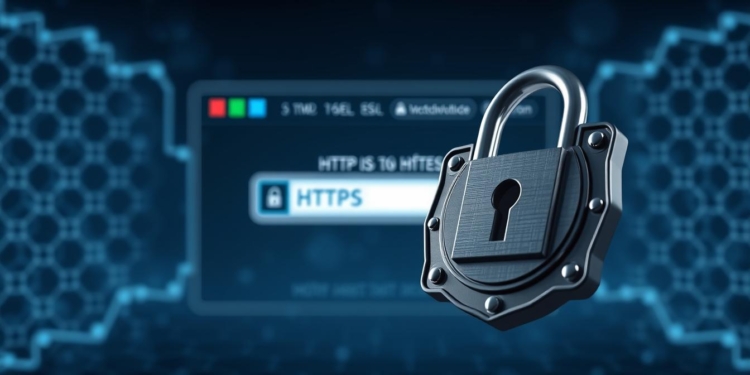Have you ever wondered why some websites display a padlock icon while others don’t? This small symbol is more than just a visual cue—it’s a sign of trust and security. SSL certificates are the backbone of website security, ensuring that data shared between users and websites remains encrypted and protected.
SSL certificates are essential for any business aiming to build credibility and comply with HTTPS standards. They encrypt sensitive information, such as login details and payment transactions, preventing unauthorized access. Browsers like Chrome and Firefox use padlock icons and “https://” to signal secure connections, giving users peace of mind.
Choosing the right SSL certificate doesn’t have to be expensive. Many trusted Certificate Authorities (CAs), like DigiCert, offer cost-effective solutions tailored to your needs. Whether you’re running a small blog or a large e-commerce site, there’s an SSL certificate for you.
In this article, we’ll explore the types of SSL certificates, how to install them, and the benefits they bring to your website’s security and trustworthiness. Stay tuned to learn how to make your site safer and more reliable for your visitors.
Key Takeaways
- SSL certificates encrypt data to protect user information.
- Browsers display padlock icons and “https://” to indicate secure connections.
- Affordable SSL options are available for businesses of all sizes.
- Trusted Certificate Authorities like DigiCert ensure reliability.
- SSL certificates enhance website credibility and user trust.
What Are SSL Certificates and Why Are They Important?
Ever wondered what makes a website secure and trustworthy for users? The answer lies in SSL certificates. These digital certificates are the foundation of online security, ensuring that data shared between users and websites remains private and protected.
SSL, or secure sockets layer, is a protocol that encrypts data during transmission. Its successor, transport layer security (TLS), offers even stronger encryption. Together, they create a secure channel for sensitive information like credit card details and login credentials.
When you visit a website, your browser checks for an SSL certificate. If present, it establishes a secure connection using public key and private key pairs. The public key encrypts the data, while the private key decrypts it, ensuring only the intended recipient can access the information.
Unsecured websites using HTTP are vulnerable to eavesdropping and phishing attacks. In contrast, HTTPS (HTTP with SSL) ensures data integrity and confidentiality. This is why browsers display a padlock icon and “https://” for secure sites.
Certificate Authorities (CAs) play a crucial role in issuing SSL certificates. They validate domain ownership and organizational identity, ensuring the certificate is legitimate. Without this validation, websites risk losing user trust and exposing sensitive data.
In summary, SSL certificates are essential for protecting user data, building trust, and complying with modern security standards. They’re not just a technical requirement—they’re a commitment to user safety.
How SSL Certificates Work
What happens behind the scenes when you visit a secure website? The answer lies in the SSL handshake, a process that ensures your connection is safe and encrypted. This handshake is the foundation of online security, enabling secure communication between your browser and the server.
The SSL Handshake Process
The SSL handshake involves six key steps. First, the server identifies itself by sending its SSL certificate to the browser. Next, the browser verifies the certificate against a trusted root Certificate Authority (CA) store. Once verified, the browser and server agree on a session key for symmetric encryption.
During this process, the server uses its private key to decrypt data, while the browser uses the public key to encrypt it. This ensures that only the intended recipient can access the information. Finally, the session key is used for efficient and secure communication.
Public and Private Keys Explained
Public and private keys are essential for the SSL handshake. The public key encrypts data, while the private key decrypts it. This asymmetric encryption ensures that even if the public key is intercepted, the data remains secure.
Once the handshake is complete, the session key enables symmetric encryption. This method is faster and more efficient for ongoing communication. For example, Chrome validates a DigiCert-issued certificate by checking its key length, such as RSA 2048-bit or ECC 256-bit, to ensure brute-force resistance.
In summary, the SSL handshake is a critical protocol that protects your data. It combines asymmetric and symmetric encryption to create a secure connection, giving you peace of mind while browsing.
Types of SSL Certificates
Not all SSL certificates are created equal—understanding the differences can help you choose the right one for your website. SSL certificates vary in validation rigor, use cases, and pricing, making it essential to select the one that aligns with your needs.
Domain Validation (DV) SSL Certificates
Domain Validation (DV) certificates are the most basic type, requiring only proof of domain ownership. This is typically done through email verification. DV certificates are affordable, with prices ranging from $5.99 to $79.99 per year.
These certificates are ideal for blogs and personal websites that don’t handle sensitive data. However, they offer minimal authentication, making them vulnerable to misuse by phishing sites that display padlock icons to appear trustworthy.

Organization Validation (OV) SSL Certificates
Organization Validation (OV) certificates require more rigorous checks. Certificate Authorities (CAs) verify the organization’s name, type, status, and physical address. This level of authentication adds credibility, making OV certificates suitable for login portals and business websites.
OV certificates are a step up from DV, offering better trust and security. They are often used by companies that need to validate their identity to users.
Extended Validation (EV) SSL Certificates
Extended Validation (EV) certificates provide the highest level of trust. CAs conduct extensive checks, including verifying the organization’s legal and operational existence. This often involves a phone call to confirm the requestor’s employment status.
EV certificates are recommended for e-commerce sites and financial institutions. They display a green address bar and the company’s name, offering immediate assurance to users. For example, Namecheap offers EV certificates starting at $45.99 per year.
In summary, choosing the right SSL certificate depends on your website’s needs. DV is cost-effective for basic sites, OV adds credibility for businesses, and EV offers the highest trust for sensitive transactions.
Choosing the Right SSL Certificate for Your Website
Selecting the right SSL certificate for your website can feel overwhelming, but it doesn’t have to be. The key is understanding your site’s specific needs and matching them with the right features. Whether you’re protecting a blog or an e-commerce platform, the right choice ensures both security and user trust.
Assessing Your Website’s Security Needs
Start by evaluating your website’s traffic volume and the sensitivity of the data it handles. For example, a small blog with minimal user interaction may only need a Domain Validation (DV) certificate. However, an e-commerce site processing payments requires a higher level of security, such as an Extended Validation (EV) certificate.
Multi-domain or wildcard certificates are ideal for websites with multiple subdomains. These options, like those offered by Comodo, provide flexibility and cost savings by covering several domains under one certificate.
Comparing SSL Certificate Features
When comparing SSL certificates, focus on encryption levels. 128-bit encryption is standard, but 256-bit offers enhanced security for sensitive data. Wildcard certificates are particularly beneficial for sites with numerous subdomains, as they simplify management and reduce costs.
Tools like Namecheap’s SSL Wizard can help you compare features and make an informed decision. Additionally, ensure your certificate meets browser compatibility requirements, such as supporting SHA-2 or SHA-3 algorithms.
In summary, choosing the right SSL certificate involves balancing security needs, cost, and ease of management. By carefully assessing your website’s requirements, you can select a certificate that protects your data and builds user trust.
How to Get an SSL Certificate
Securing your website starts with understanding how to obtain an SSL certificate. This process involves purchasing the right certificate and generating a Certificate Signing Request (CSR). Both steps are essential for ensuring your site’s security and trustworthiness.
Steps to Purchase an SSL Certificate
Purchasing an SSL certificate is straightforward. First, select the type of certificate that fits your needs, such as Domain Validation (DV) or Extended Validation (EV). Next, provide your domain name and submit a CSR. Many providers, like Namecheap, offer quick activation—often within 15 minutes.
Generating a Certificate Signing Request (CSR)
Generating a CSR is a critical step in the process. This involves creating a public key and private key pair. Tools like cPanel or Plesk simplify this task with user-friendly interfaces. During CSR generation, you’ll need to provide specific details, including the Common Name (your domain), Organization, and Locale.
Once generated, store your private key securely. Best practices include encrypting the key and keeping an off-server backup. This ensures your data remains protected even if your server is compromised.
If you encounter issues, Namecheap offers 24/7 support for CSR troubleshooting. Their team can guide you through the process, ensuring your certificate is activated without delays.
In summary, obtaining an SSL certificate involves selecting the right type, generating a CSR, and securely managing your keys. Following these steps ensures your website is secure and trusted by users.
Installing Your SSL Certificate
Ready to secure your website? Installing an SSL certificate is easier than you think. The process involves preparing your server, uploading the certificate, and verifying the setup. With the right steps, you can ensure a secure connection for your users.

Preparing Your Server for Installation
Before you begin, ensure your web server meets the requirements. You’ll need a dedicated IP address, SNI compatibility, and an open port 443. These are essential for a smooth installation process.
Intermediate certificates are also crucial. They link your SSL certificate to the root Certificate Authority (CA), ensuring trust. Combine your domain certificate (domain.crt) with the intermediate certificate (intermediate.crt) to create a complete certificate chain.
Step-by-Step Installation Guide
Start by uploading your certificate files to the server. For Apache, use the following code snippet:
<VirtualHost *:443>
SSLEngine on
SSLCertificateFile /path/to/domain.crt
SSLCertificateKeyFile /path/to/private.key
SSLCertificateChainFile /path/to/intermediate.crt
</VirtualHost>
For Nginx, use this configuration:
server {
listen 443 ssl;
ssl_certificate /path/to/domain.crt;
ssl_certificate_key /path/to/private.key;
ssl_trusted_certificate /path/to/intermediate.crt;
}
After installation, verify the setup using SSL Checker tools. These tools help identify issues like mismatched Common Names (CN) or expired intermediates.
If you encounter errors, troubleshoot by double-checking your certificate files and server settings. Common issues include incorrect file paths or missing intermediate certificates. Proper verification ensures your browsers recognize the certificate, establishing a secure session for users.
Managing and Renewing Your SSL Certificate
Keeping your website secure requires ongoing attention, especially when it comes to SSL certificates. Proper management ensures your site remains trusted and functional for users. Let’s explore how to monitor expiry and handle renewals effectively.
Monitoring SSL Certificate Expiry
SSL certificates have a limited term, typically one to two years. Missing the renewal date can lead to browser warnings and traffic drops. Tools like Certbot, SSL Pulse, and Uptime Robot can help you track expiry dates and send alerts.
Namecheap, for example, sends renewal reminders 30 days before expiration. This gives you ample time to act. Regularly checking your certificate’s status ensures uninterrupted security for your domain.
Renewal Process and Best Practices
Renewing an SSL certificate involves generating a new Certificate Signing Request (CSR), validating your domain, and installing the updated certificate. Namecheap offers free reissuing for CSR changes, making the process seamless.
For websites with multiple certificates, staggered renewal is a smart strategy. This avoids simultaneous expirations and reduces administrative burden. Always verify the installation using tools like SSL Checker to ensure everything is in place.
Activating auto-renewal is another best practice. Namecheap’s auto-renewal feature ensures your certificate is renewed before expiry, eliminating the risk of downtime. This is especially useful for busy site owners who may overlook manual renewals.
In summary, managing and renewing your SSL certificate is crucial for maintaining website security. Use monitoring tools, follow renewal steps, and consider auto-renewal to keep your site secure and trusted by users.
Benefits of SSL Certificates for Your Website
Why do secure websites outperform their unsecured counterparts? The answer lies in the benefits of SSL certificates. These digital tools not only protect your data but also enhance your site’s credibility and performance. Let’s explore how SSL certificates can make a difference for your website.
Enhancing User Trust and Confidence
When users see a padlock icon or “https://” in their browser, they feel safer. This visual cue signals that their data is encrypted and protected. Studies show that 85% of users abandon unsecured checkout pages, while secured sites retain 37% more visitors.
For e-commerce sites, SSL certificates are essential for PCI DSS compliance. This standard ensures that payment data is handled securely, reducing the risk of fraud. By displaying trust indicators, you can increase conversions and build long-term customer loyalty.
Improving Search Engine Rankings
Google has confirmed that HTTPS is a ranking signal. Websites with SSL certificates often rank higher in search engine results. This gives you a competitive edge, driving more organic traffic to your site.
Unsecured sites may also trigger “Not Secure” warnings in search results. These warnings can deter users and harm your site’s reputation. By implementing SSL, you avoid these penalties and improve your visibility online.
In summary, SSL certificates offer a dual advantage: they build trust with users and boost your site’s performance in search engines. Investing in SSL is a smart move for any website aiming to succeed in today’s digital landscape.
Conclusion
Securing your website with an SSL certificate is a critical step in building trust and protecting user data. When choosing a certificate, consider the validation level, domain coverage, and warranty to ensure it meets your needs. Affordable options from trusted providers like Namecheap and Comodo make it easy to enhance your site’s security without breaking the bank.
Take action today to safeguard your website and boost user confidence. Emerging trends like post-quantum cryptography and automated renewals are shaping the future of encryption, so staying ahead is essential. Before making a decision, verify the Certificate Authority’s reputation, browser compatibility, and available support.
Investing in an SSL certificate is more than a technical requirement—it’s a commitment to your users’ safety and your site’s credibility. Start now to create a secure, trustworthy online presence.
FAQ
What is an SSL certificate?
An SSL certificate is a digital certificate that authenticates a website’s identity and enables an encrypted connection. It ensures data exchanged between a user’s browser and the web server remains secure.
Why is an SSL certificate important for my website?
An SSL certificate is crucial for protecting sensitive information like credit card details and login credentials. It also builds user trust, improves search engine rankings, and helps meet compliance standards.
How does the SSL handshake process work?
The SSL handshake is a process where the server and browser establish a secure connection. It involves exchanging encryption keys, verifying the server’s identity, and creating a session key for data encryption.
What are public and private keys in SSL?
Public and private keys are a pair of cryptographic keys used in SSL encryption. The public key encrypts data, while the private key decrypts it, ensuring secure communication between the user and the server.
What types of SSL certificates are available?
There are three main types: Domain Validation (DV), Organization Validation (OV), and Extended Validation (EV). Each offers different levels of authentication and security features.
How do I choose the right SSL certificate for my website?
Assess your website’s security needs, such as the level of trust you want to establish and the type of data you handle. Compare features like validation level, warranty, and compatibility with browsers.
How can I get an SSL certificate?
Purchase an SSL certificate from a trusted Certificate Authority (CA), generate a Certificate Signing Request (CSR) on your server, and complete the validation process to receive your certificate.
How do I install an SSL certificate on my server?
Prepare your server by ensuring it supports SSL, then follow the CA’s installation guide. This typically involves uploading the certificate and configuring your server settings.
How do I manage and renew my SSL certificate?
Monitor your certificate’s expiry date and set reminders. Renew it before expiration by following the CA’s renewal process, which often involves revalidation and reissuing the certificate.
What are the benefits of using an SSL certificate?
SSL certificates enhance user trust, protect sensitive data, improve search engine rankings, and help comply with security standards like PCI DSS.














